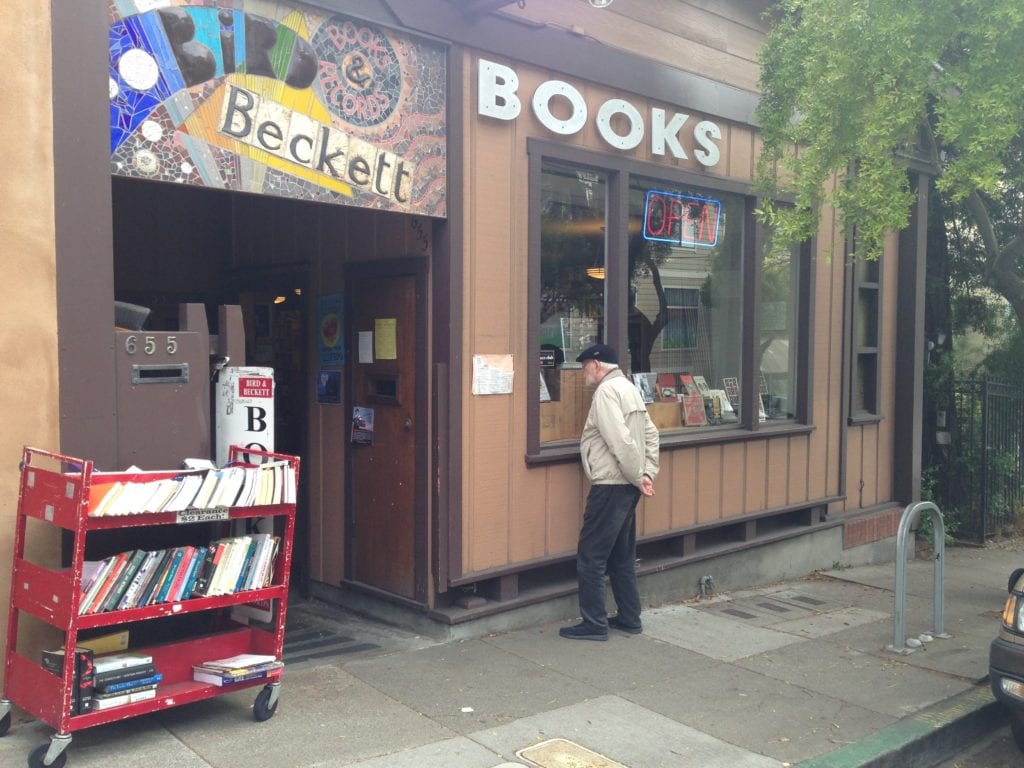
With dire warnings from City public health officials that the coronavirus will continue through a dark winter and with California beginning a statewide curfew, Eric Whittington, owner of Bird and Beckett Books and Records continues keeping Glen Park supplied the latest in best seller releases and used titles.
“As long as the COVID numbers stay high the store’s hours have been shortened a bit and my limit of customers has been reduced,” Whittington told the Glen Park News. “If the City mandates something more restrictive, we’ll comply.”
For the latest news, check in at the store’s website here: http://www.birdbeckett.com
Bird & Beckett has operated continuously since 1999, only closing for a couple of days during the move from Diamond to Chenery Streets in August 2008.
“Since the pandemic began, we’ve continued to operate and sell books at the store gate or from the vestibule while I relied for a while upon hand delivering to customers who feared leaving their homes,” Whittington said.
It was only in mid-June, when the City changed its mandate, that he allowed limited numbers of customers to browse and make in-person purchases. That was good news to booklovers who pined for the opportunity to circulate among Whittington’s curated inventory despite limits on the number who can do so at one time.
“The luxury of more browsers for longer stretches will have to wait until the virus is really in retreat once again,” he said. “I’m appreciative of everyone’s understanding and cooperation,” he continued, “as we strive to keep one another safe and healthy.”
But browsing is only one way to get the books you need to survive the pandemic. “Orders are always welcome by email, phone or in person,” he said.
In the spring during COVID’s early spike Whittington set forth, Internet or telephone orders in hand, and canvased the city with paper and hardbacks for housebound customers. He witnessed firsthand that not everyone is guaranteed safety and health.
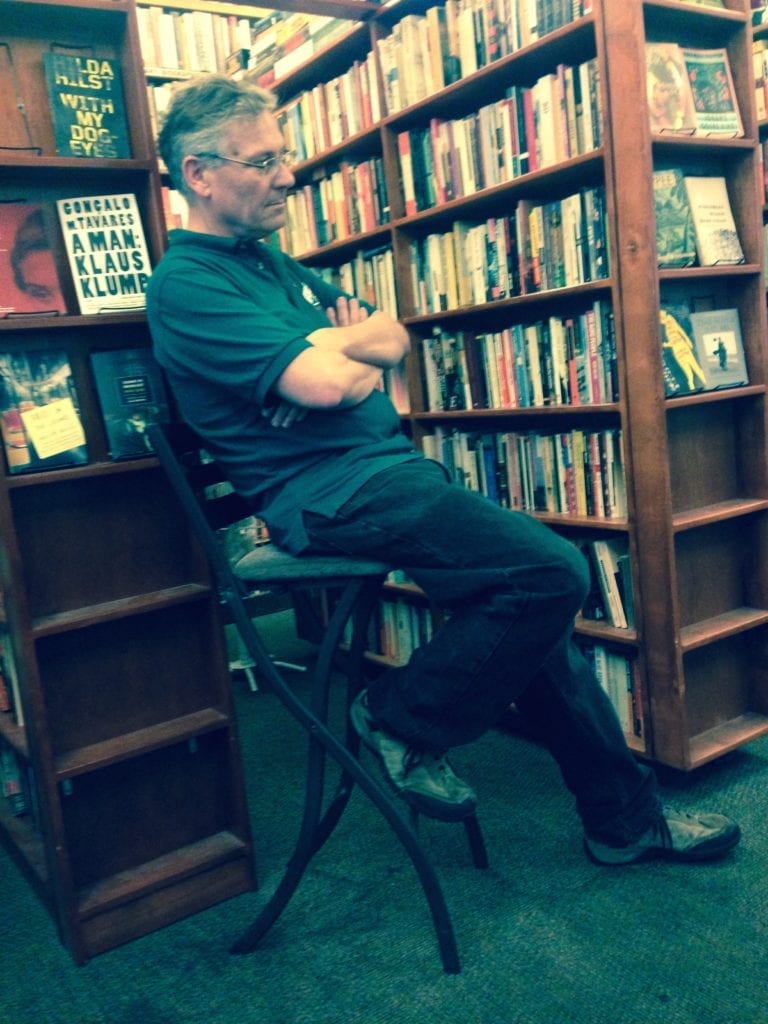
“I drove throughout the city and delivered books,” he said, about navigating neighborhoods such as portions of the Tenderloin, filled with the tents of the unhoused and strewn with suitcases and discarded drug paraphernalia.
“Here we’re insulated from what I saw north of Golden Gate Avenue,” he said, referencing his Glen Park bubble.
But now, with a grim third surge, with a horrific milestone of nearly 257,000 deaths nationwide, and with a staggering number of patients requiring hospitalization, Whittington is in an even more vigilant mode in his effort to keep customers and staff safe.
He’s proven adapt during the accelerating health crisis at pivoting.
Scratching out a living but not giving up
“This means I’ll be working alone, paying my staff to stay home during the current surge,” he said, about Jenna Littlejohn and Michael Koch, “or trying to because Michael has continued to come in for his regular shift though I’m encouraging him to bail anytime he feels like it’s time to duck and cover.”
“As in the spring,” he emphasized, “the gate will stay open during store hours so people can approach the Dutch door, one person or small family unit at a time in the vestibule.”
The pandemic has brought an uptick in business. Once he was able to reopen for touchless sales, loyal customers besieged him with orders. That only increased when Mayor London Breed allowed them to browse store shelves.
“There’s been a significant bump in business,” Whittington said. “I know it’s because my customer base wants to support us.”
“Building on good months between the last holiday season and March when COVID hit, we’ve had a healthy cash flow and people seem to be buying books and reading them at a good clip,” he said. “Now, with COVID, I’ve been selling lots of Toni Morrison and armchair travel, but few if any travel guides. Escapist fare such as Carl Hiaasen, too.”
Dickens and Dostoevsky and now Barak Obama’s new memoir have been leaping from shelves as well.
With librarians given temporary assignment as pandemic contact tracers – with over 100 still on temporary duty assignments – and with branch libraries closed except for a small number such as Excelsior and Merced that offer curb side pick-up, independent bookstores such as Bird & Beckett have taken up the slack.
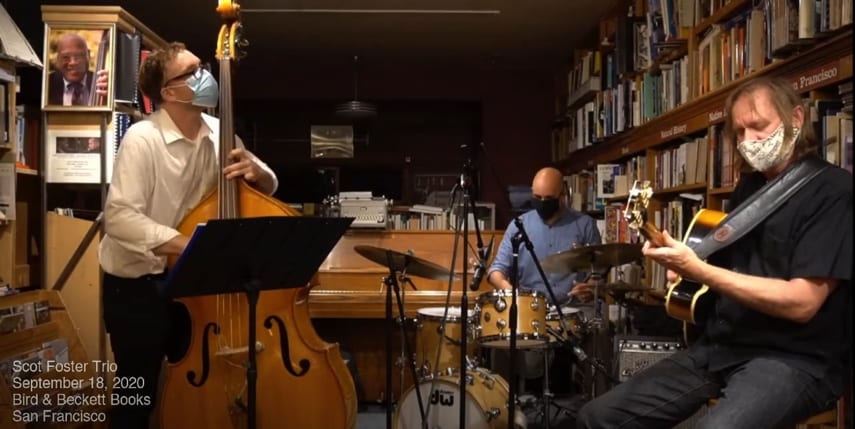
“Hopefully people will realize that it’s more important than ever that they support the store with their book business and their donations to the nonprofit,” Whittington said. “If that happens I anticipate that we’ll squeak through and come out the other side strong and not laden with debt.”
But Glen Park’s bibliophile is quick to knock down images that he somehow does this for amusement’s sake while he lives happily on a trust fund or some other source of income.
“Some folks might think I have tech industry riches that I’m spending on my hobby or that I’m a scion of a wealthy family,” he said. “That’s not the case. This business has always been reliant on cash flow, debt and living on a shoestring in this expensive city.”
“We’re optimistic that when the pandemic is mostly just a bad memory the store will have new status in San Francisco that will carry us forward due to the quality of our inventory, the pleasure afforded by virtue of our presentation of top echelon local jazz musicians working for respectable guarantees, the support given from the generous Conner Family Trust, donations to our Cultural Legacy Project non-profit and grants from the Arts Hotel Tax Fund.”
The jazz streaming learning curve
For the past 18 years, Bird & Beckett has featured A-list San Francisco jazz luminaries such as Scott Foster, Howie Dudune, Jimmy Ryan, Henry Irvin, Chuck Peterson, Bishu Chatterjee, Eric Shrifin and vocalist Dorothy Lefkovits.
Since the day the store began featuring jazz in October 2002, Whittington has not skipped a single Friday evening performance. COVID-19 may have shuttered his doors, but he’s loathe to shut down a unique venue that houses an equally unique American musical idiom.
“When the pandemic hit we began offering a live stream that is accessed through our YouTube channel and our Facebook page and where patrons can ‘pay the band’ by making online donations,” he said. “It was a bit primitive at first since the technology isn’t easy, but we’re now operating with promise and what we experimented with through the early summer is now more sophisticated.”
“We’re streaming live music typically twice a week,” he offered, “but given the November surge we’re making adjustments to increase the safety situation for the musicians.”
A simple YouTube video gets one top-of-the-line Bird & Beckett music. Access to the Scott Foster Trio’s two-hour September 18 live stream is as simple as a mouse click. Guitarist Scott Foster fronts the quintessential jazz trio that includes Omar Aran on drums and Matt Montgomery on bass.
While Eric Whittington has been known to lob shout outs to venues such as the Masonic Auditorium or toss platitudes at stages such as the Monterey jazz amphitheater, his affection for his bookstore and his loyalty to its working musicians knows few bounds.
“The main thing from my perspective is that this is a difficult time for musicians figuring out how to make a living going forward,” he said.
Whittington spins a cautionary tale, aware that even at the best of times working jazz players tread on beds of economic quicksand, while during these worst of times they are submerged in a monetary mudslide.
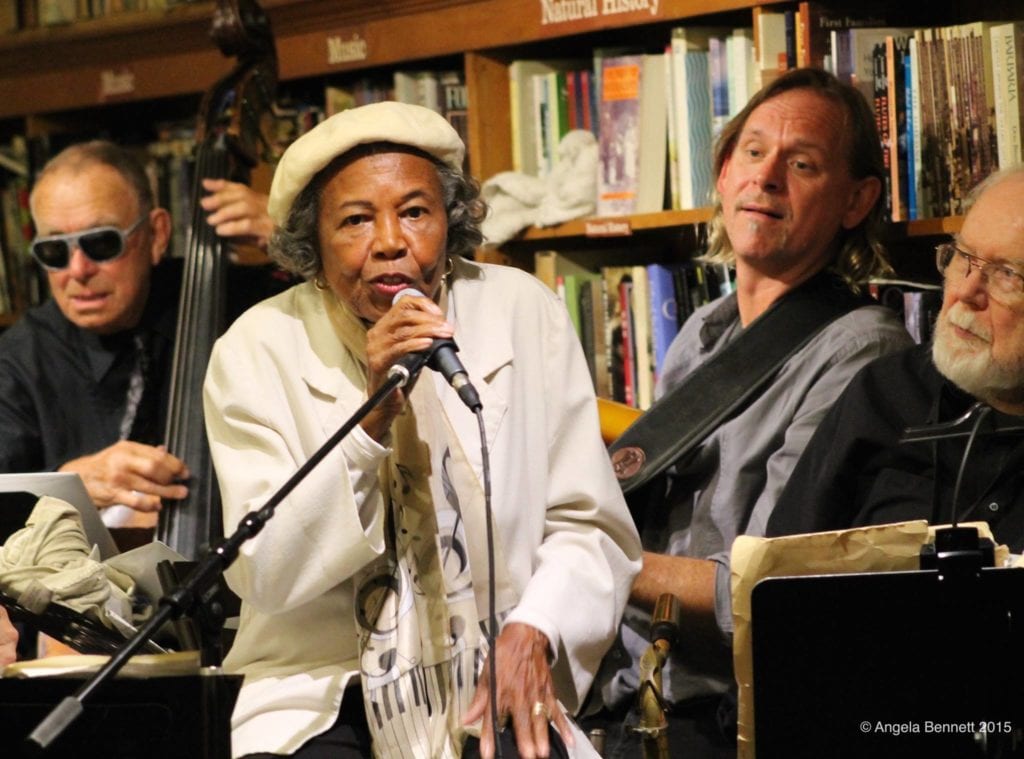
“Somebody eventually has to get to City Hall and find a way to finance the artists on a realistic basis,” he said.
Jen Campbell, author of The Bookshop Book published in 2014, wrote about spaces such as Bird & Beckett.
“These stores are time machines, spaceships, story-makers, secret keepers. They are dragon tamers, dream catchers, fact finders and safe places. They are full of infinite possibilities and tales worth taking home.”
If Whittington relishes his bookstore for providing him a livelihood and if he reveres his musicians for their perpetuation of the jazz motif, he tenders fealty to the neighborhood that has embraced him.
“I wanted to organize what could be called ‘A Celebration of Cohesion’ that is embodied in the sign ‘Glen Park Strong’ you see in village shop windows,” he said. “It could have been an extension of Slow Streets, musicians socially distanced, no speeches, no crowding, simply a promenade for two or three hours where people could listen to four or five different bands.”
The pandemic’s resurgence had other plans.
For the next months at least Eric Whittington’s vestibule will remain open. His customers will be able to wander up to his door and purchase a book or two or three, even enter in safe numbers.
And best of all there’s always his jazz. Nearly one year since the first documented case of COVID, Eric Whittington is gearing up for the holidays.
“Friday, December 25 will be only the second time our regular jazz Friday will fall on Christmas Day,” he said. “We’ll figure something out!”
He always does.
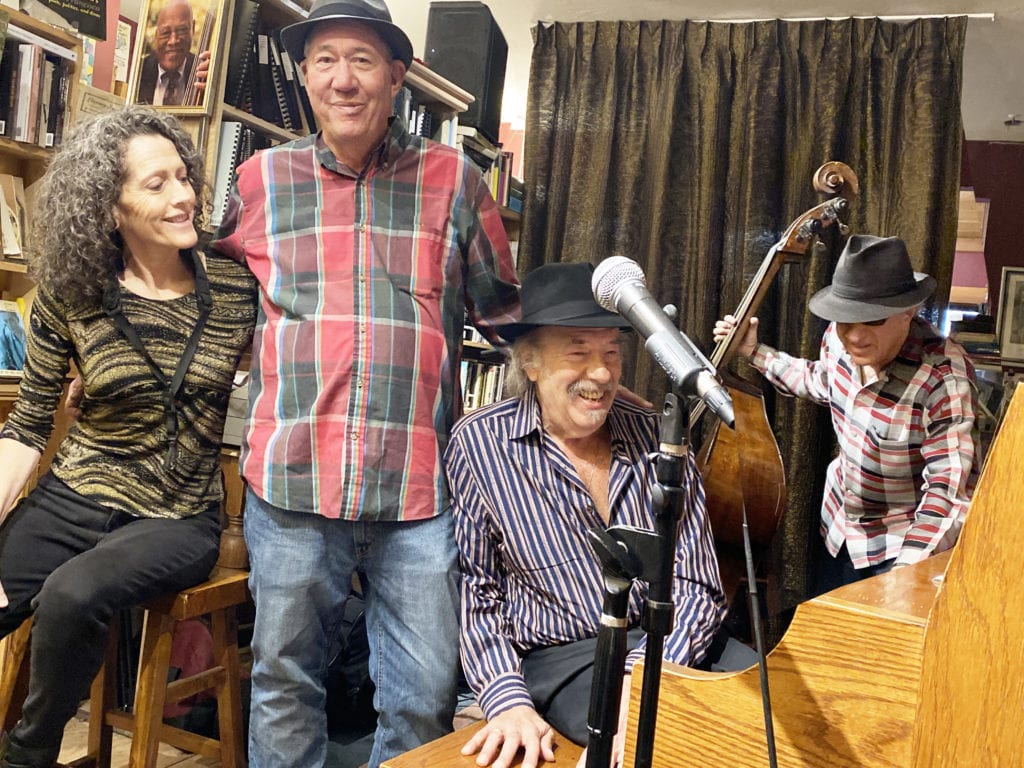
Photo 1 – Nancy Wright, Eric Shifrin, Macy Blackman & Bing Nathan
Photo: Murray Schneider